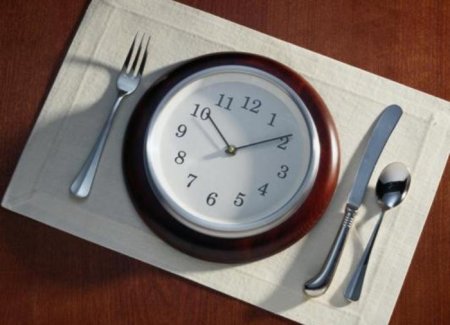As the weight and metabolic rate dependent mealtime
It is known that the change of reception time of food can affect your weight and metabolism. Based on studies in mice, we can say that the secret to better health is to limit the time period during which you eat, and, as a consequence, increase the time during which you do without food.
Research conducted a few years ago, showed that mice a diet that is rich in fat, but there are only allowed within an eight-hour interval, were healthier and leaner than the mice who were given exactly the same amount of food, but were allowed to use it at any a time when they want to.
In the new study, the same researchers again exposed hundreds of daily fasting mice of different duration - from 12 to 15 hours.
Again we found that mice that were without food for at least twelve hours, were healthier and slimmer than those who received the same amount of calories but irregularly.
But how well it will work in humans? To deal with this, the researchers drew sixteen volunteers for the 10-week study. Volunteers have been measured by the amount of fat in the body, blood sugar, fats (triglycerides) and cholesterol levels at baseline. They were then randomly assigned to one of two groups, in blue or red.
Blue Group, which was the control group, offered to do business as usual. Participants from the red group was asked to stick to their usual diet, but eat breakfast 90 minutes later, and dinner - 90 minutes earlier.
This meant that every day for an additional three hours, they were not supposed to eat. Each kept a diary of food and sleep, make sure that the amount of food remained the same as usual.
So why the same time eating the food must change something?
There are two possible mechanisms.
Firstly, there is now a body of research indicating that longer periods of time without breaking meal (fasting) useful.
In addition, it is believed that our body handles calories better during certain times of the day. According to experts, one of the worst choices - load up the sweet and fatty foods late at night, when the levels of these substances in the blood already high.
To see all this, some are solved on a bad experiment with direct private participation:
After an overnight fast at the volunteer take some blood for analysis, and then at 10:00 it is classic British breakfast eggs - lots of bacon, eggs and sausages. Directly after eating and every half hour for the next several hours, again a blood sample is taken. And yes, it's pretty painful.
Twelve hours later, at 22:00, the second meal of the day - the same as breakfast. Again, in a blood sample taken within the next few hours.
Blood tests showed that after a morning meal blood sugar levels returned to normal fairly quickly, whereas the level of fat started to fall after about three hours. However, in the evening, after the exact same meal, your blood sugar levels remained high for much longer, and fat levels in the blood is still increased for four more hours after a meal.
So the researchers are right, and our body does not like to deal with a lot of food late at night. Midnight snack worse effect on the body than the same food is eaten earlier in the day.
There is an old adage: "Eat breakfast like a king, lunch like a prince and dinner like a beggar." And she was right. If you just need to eat the eggs, eat it for breakfast.
And what is the result of the main studies involving volunteers, divided into two groups? At the end of the tenth week of volunteers gathered together and took repeated analyzes.
Researchers have found that the members of the red group, which later lunch and dinner earlier on average lost more fat, and their blood sugar levels were observed, and decrease cholesterol, as compared to controls.
So the results of the first randomized trial of its kind conducted on humans, positive.
Rigid constraints in the adoption of food for a lot of people are not very practical. But maybe this will help you to give up sandwiches at night.
